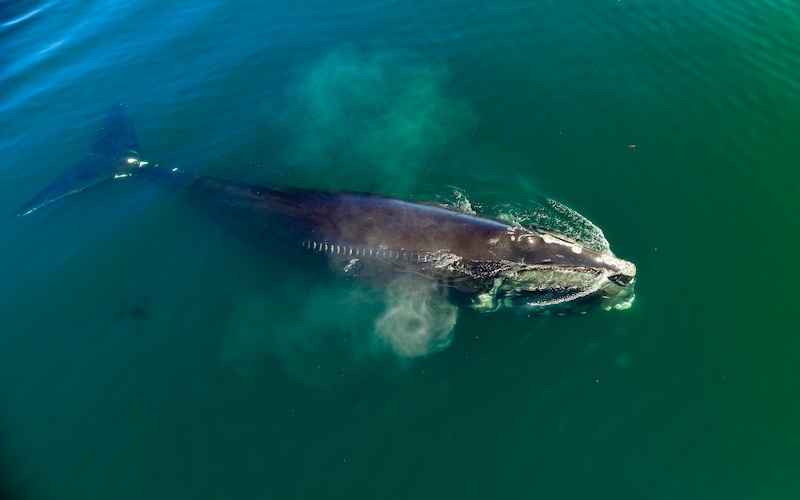
Photo: Brian Skerry/Steve De Neef
September 28, 2023 (WASHINGTON)— Conservation groups filed an emergency rulemaking petition with NOAA Fisheries today to protect critically endangered North Atlantic right whales from being struck and killed by vessels along the U.S. East Coast. Today’s filing comes ahead of the upcoming calving season.
The request mirrors a similar 2022 petition, which the agency denied. As an explanation for last year’s denial, the agency said it was focusing on releasing a final updated speed rule. Nearly one year later, however, the agency has not yet released the rule, which would set speed limits for additional vessels and expand the areas where current speed limits apply.
“Just seven months ago, another right whale was killed off Virginia Beach, yet nothing has changed on the water,” said Erica Fuller, senior attorney at Conservation Law Foundation. “NOAA Fisheries has proposed a strong rule and their Office of Law Enforcement has made clear they’ll do everything they can to enforce it. Unfortunately, special interest groups in Congress have created a campaign of misinformation that now threatens to derail and delay protections. These are unnecessary deaths — we urge the agency to take action now.”
The petition requests that the rule be released by Nov. 15, the start of the 2024 calving season, to immediately protect whales migrating to and from the calving habitat in the southeast U.S. In February 2021 a vessel struck and killed a right whale mother and her newborn off the Florida coast. This past February an adult male right whale was killed by a passing vessel off Virginia.
“Right whales can’t withstand any more delay on protections, nor should they have to,” said Kristen Monsell, oceans legal director at the Center for Biological Diversity. “Even one ship strike would bring these whales closer to extinction, but speed limits can help prevent that. Federal officials can’t sit back and do nothing while right whales are in danger.”
Vessel strikes are one of two primary threats to North Atlantic right whales’ existence; the other is accidental entanglements in commercial fishing gear. Since 2017 at least 16 right whales have been killed or injured by vessel strikes. NOAA Fisheries has stated that the loss of even one whale from human causes each year can jeopardize the future of this species. The agency has determined that current regulations are not sufficient to protect the whales in light of shifting distributions of right whales, but no new measures have been implemented in a decade.
“There are no current technological solutions that would prevent vessel collisions better than slowing down, which is why there are speed zones around schools,” said Regina Asmutis-Silvia, executive director of Whale and Dolphin Conservation. “Windshield wipers and daytime running lights improve driving safety, but not to a point where we allow cars to speed past schools and it’s the same thing when it comes to vessel collisions; there is no better way to protect both boaters and whales other than slowing down when and where right whales are found seasonally.”
Today’s petition comes after numerous attempts in recent months by special interest groups to prevent any additional vessel speed restrictions. Those special interest groups have cited a need for technological solutions that do not yet exist.
The conservation groups’ petition urges NOAA Fisheries to immediately apply the agency’s updated rule and asks the agency to make dynamic speed zones mandatory following several reports that vessels are not complying with voluntary measures.
Scientists at the New England Aquarium recently determined that fewer than 340 North Atlantic right whales remain, including about 70 reproductive females. The population has continued to decline from previous years, and right whales only give birth every 3 years to 10 years.
Experts are available for further comment.
###

